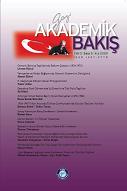A Review About Beckett’s the Happy Days
Beckett’in Mutlu Günler Oyunu Üzerine Bir İnceleme
Author(s): Ümran TürkyılmazSubject(s): History
Published by: Gazi Akademik Bakış
Keywords: Samuel Beckett; Happy Days; absurd theatre; nihilism; absurdity; existence
Summary/Abstract: The Happy Days, a play consisting of two episodes, that was written by Samuel Beckett is examined by a thematic view. In the Happy Days, it is mentioned about the tragicomic destiny of a couple, named Winnie and Willie, whose value judgements were ruined and haven’t keep the changing and advancing hope, haven’t found a way to go out, and have discrepancies with life. In this play, Beckett reflects conspicuously the existence-war of the human-beings who carried out their non-communicational, lonely, inconsistent and disjointed lives in a manner of vicious circle. In this play loaded with back-up meanings, the attention of the writer directs to the psychical nature of human-being who has a destiny to live into a physical and consciousness collapse. As an incurable witness to the 20th Century, the human-being as the object of ambiguities, struggles, losses, hopes, dreams and disappointments exposes oneself by spoiling the language and the body.
Journal: Gazi Akademik Bakış
- Issue Year: 2009
- Issue No: 05
- Page Range: 195-206
- Page Count: 12
- Language: Turkish

